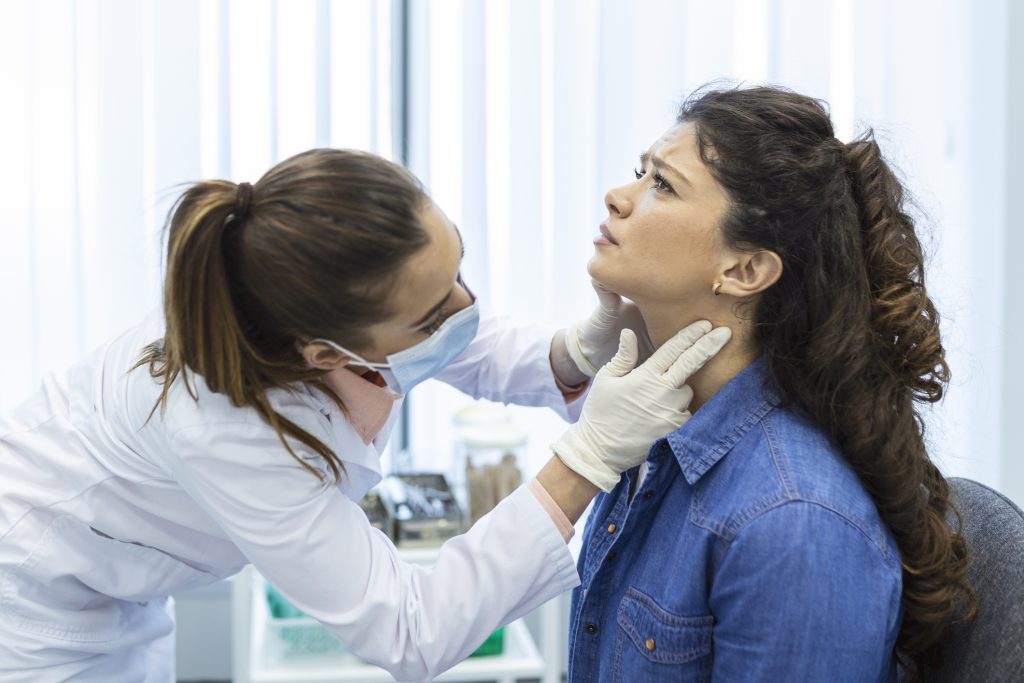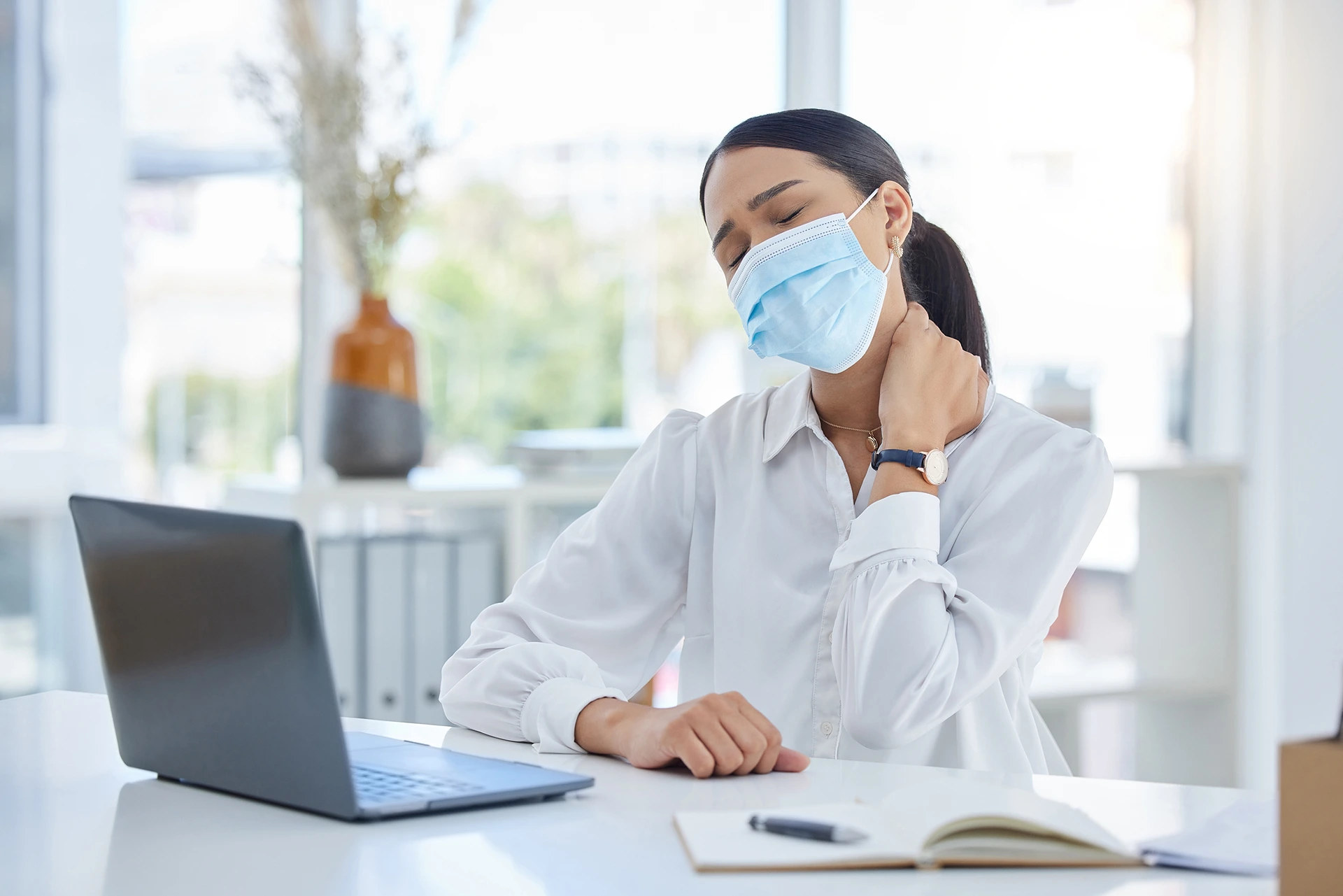If you’ve recently been infected with COVID-19, you may have noticed some annoying neck pain creeping in shortly after getting sick. And you’re not alone in this situation- neck pain seems to be a common residual symptom many are experiencing during and after battling COVID-19.
In fact, emerging research is showing that neck pain is one of the most frequently reported musculoskeletal issues post-COVID infection.
Recent studies have shown that neck pain was one of the most prevalent symptoms among patients who were recovering from COVID.
So what’s causing this uptick in neck discomfort after COVID? And more importantly – what can you do to manage and prevent it?
How Does COVID-19 Cause Neck Pain in the First Place?
Before diving into solutions, it helps to understand the possible mechanisms causing neck pain after a COVID-19 infection in the first place. Here are a few leading theories researchers have proposed:
Inflammation and Immune Response
One of the hallmark characteristics of COVID-19 is that it triggers a major inflammatory response and cytokine release throughout the body. Cytokines are small proteins that act as immune system signaling molecules.
Researchers believe this excessive inflammation and “cytokine storm” could irritate nerves in the neck and cervical spine area, leading to neuropathic pain signals being sent to the brain.
There is also speculation that the immune response may inadvertently attack the myelin sheaths around nerves, disrupting appropriate nerve signaling. Damaged myelin sheathing has been linked to some chronic pain conditions.
Muscle Stiffness and Injury
Lying prone and inactive in bed for extended periods while sick can cause muscular tightness and trigger points. The neck extensor muscles group along the back of the neck commonly stiffen up when overstretched in a prolonged position.
Coughing fits from COVID may also strain the muscles of the neck and upper back. Muscle guarding kicks in to stabilize and protect the area, but can lead to spasms and myofascial knots.
Postural Changes
If you worked remotely during your COVID illness, you likely logged some long hours hunched over your laptop in bed or on the couch. This poor neck posture stresses the cervical spine and surrounding musculature.
New postural habits adopted while recovering may also contribute to neck discomfort. The neck has to work harder to stabilize the head when your overall posture is off-kilter.
Secondary Injuries and Effects
While not a direct viral symptom, neck pain can stem from secondary lifestyle impacts of having COVID-19. Some examples include:
- Increased stress, anxiety, and depression while sick and in isolation
- Poor ergonomics and “computer hunch” from more device usage
- Falling, straining neck accidentally, while weak and fatigued
- Pre-existing neck issues flaring up from inactivity while sick
- Medication side effects or interactions
As you can see, there are many potential ways neck pain can creep up in the wake of a COVID infection. But how can you tell if your neck discomfort is directly related to COVID-19?
Is Neck Pain a Primary Symptom of COVID-19 Itself?

The jury is still out on whether neck pain stems primarily from COVID-19 attacking the cervical area directly, or if it’s more of a secondary effect from inflammatory cascade and musculoskeletal impacts.
Some doctors argue COVID-19 is unlikely to directly infect the structures of the neck early on, as the virus preferentially targets the upper and lower respiratory system first.
However, one theory proposes that later in the disease progression, the virus may migrate to the cervical spine area and infect nerve roots and meningeal coverings. There is precedent for other coronaviruses causing neurological symptoms.
More research is still needed to determine if the virus itself infiltrates neck structures directly, or if resulting immune response and inflammatory mediators are to blame.
What Does Post-COVID Neck Pain Feel Like?
If you start experiencing neck soreness or tightness after COVID-19, pay close attention to the specific characteristics of your discomfort. Here are some patterns reported by patients:
| Covid Neck Pain Details | |
| Location | Base of the skull Upper trapezius muscles Back of the neck Sides of the neck Pain radiating from neck to shoulders or arms |
| Quality | Achy soreness Tight stiffness Throbbing and piercing pain Diffuse tenderness upon palpation |
| Intensity | Pain ranges from mild to severe Intermittent or constant pain Acute pain starting 1-2 weeks after infection Chronic pain lasting months |
| Duration | Comes and goes Constant lingering pain Gradual improvement over weeks Persistent long after acute illness |
| Other Associated Symptoms | Headache Dizziness Tingling or numbness in limbs Decreased range of motion Muscle weakness |
Paying attention to the specific characteristics of your discomfort can provide clues into the source of the problem. For example, nerve-related pain tends to shoot or radiate down the arms. Muscular pain is more localized.
Make note of any positions, movements or activities that aggravate or alleviate the pain. Also track the timing and duration of your symptoms. All of these details will help your health providers determine the right treatment approach.
Seeking Medical Care for Persistent Post-COVID Neck Pain
If neck pain arises while you are still actively infected with COVID-19, focus on symptom management through rest, hydration, OTC medications, and gentle heat/ice therapy. Avoid any manipulative therapies until infection has passed.
However, if neck pain persists well after your initial illness, it’s important to seek medical care. Chronic neck pain can stem from many undertreated conditions:
- Herniated or bulging discs
- Nerve impingement
- Arthritis
- Pinched nerves
- Whiplash injuries
- Muscle strain
Minor neck stiffness often resolves within a week or two. But any pain lasting over 3-4 weeks warrants medical evaluation. Be sure to monitor for any additional red flag symptoms that require emergency care:
- Numbness, weakness in limbs
- Bowel/bladder incontinence
- Fever, chills
- Unexplained weight loss
What Can I Do to Prevent Post-COVID Neck Pain in the First Place?
Ideally, we’d love to avoid pesky neck pain altogether after an illness. While not always possible, here are some proactive tips:
Rest Up and Take It Easy
Your body needs adequate rest while fighting any infection. This limits stress to the musculoskeletal system during recovery. Light mobilization prevents stiffness.
Hydrate, Manage Fevers
Staying hydrated and controlling fevers with medications helps calm systemic inflammation that could irritate cervical tissues.
Monitor Your Posture
Be mindful of joint positioning while lying down and sleeping. Avoid over stretching the neck for prolonged periods.
Use Devices Ergonomically
Bring devices to eye level to avoid neck strain when working in bed. Take frequent breaks from screens to vary your posture.
Try Easy Stretches and Exercises
Gentle neck stretches, shoulder rolls, and posture resets can help ease muscular tightness proactively. Start basic neck and scapula exercises once illness has passed.
Consider Early Physical Therapy
If significant neck pain develops, starting PT early on can help re-establish proper movement patterns and strength before chronic issues develop.
Treat Any Pre-Existing Neck Problems
Make sure any arthritis, disc problems, or nerve impingements are optimally managed before any new injury or illness.
Reduce Stress
Chronic stress and anxiety tenses neck muscles and intensifies pain signals. Relaxation techniques help modulate these effects.
Optimize Your Workstation Ergonomics
Review your remote office setup and make adjustments to prevent “computer hunch.” This reduces postural strain on the neck.
Wrap It Up: Finding Relief for Your Neck Pain

If you’re struggling with persistent neck discomfort, especially after an illness like COVID-19, don’t lose hope. With the right guidance, you can find real relief.
However, for moderate to severe neck pain lasting more than a few weeks, it’s important to connect with a licensed specialist. Kaly makes it easy to find local providers, compare credentials, book online appointments, and read verified reviews.
